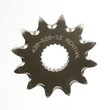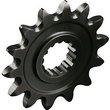2006 - 2012
BETA RR 450
12t front sprocket
| RENTHAL


Fits to:
BETA RR 450 [2006 - 2010]
BETA RR 450 ENDURO 4T [2012 - 2012]
BETA RR 450 Racing [2009 - 2009]
BETA RR 450 Supermotard [2011 - 2011
BETA RR 450 Factory [2011 - 2011
BETA RR 450 ENDURO 4T [2012 - 2012
BETA RR 450 [2011 - 2012]
2005 - 2009 BETA RR 450
Transmision ratio:
| 11 | 12 | 13 | 14 | 15 | 16 | ||
| 41 | 3.73 +4.4% | 3.42 -4.3% | 3.15 -11.7% | 2.93 -18.0% | 2.73 -23.5% | 2.56 -28.2% | |
| 42 | 3.82 +6.9% | 3.50 -2.0% | 3.23 -9.5% | 3.00 -16.0% | 2.80 -21.6% | 2.62 -26.5% | |
| 43 | 3.91 +9.5% | 3.58 +0.3% | 3.31 -7.4% | 3.07 -14.0% | 2.87 -19.7% | 2.69 -24.8% | |
| 44 | 4.00 +12.0% | 3.67 +2.7% | 3.38 -5.2% | 3.14 -12.0% | 2.93 -17.9% | 2.75 -23.0% | |
| 45 | 4.09 +14.5% | 3.75 +5.0% | 3.46 -3.1% | 3.21 -10.0% | 3.00 -16.0% | 2.81 -21.3% | |
| 46 | 4.18 +17.1% | 3.83 +7.3% | 3.54 -0.9% | 3.29 -8.0% | 3.07 -14.1% | 2.88 -19.5% | |
| 47 | 4.27 +19.6% | 3.92 +9.7% | 3.62 +1.2% | 3.36 -6.0% | 3.13 -12.3% | 2.94 -17.8% | |
| 48 | 4.36 +22.2% | 4.00 +12.0% | 3.69 +3.4% | 3.43 -4.0% | 3.20 -10.4% | 3.00 -16.0% | |
| 49 | 4.45 +24.7% | 4.08 +14.3% | 3.77 +5.5% | 3.50 -2.0% | 3.27 -8.5% | 3.06 -14.2% | |
| 50 | 4.55 +27.3% | 4.17 +16.7% | 3.85 +7.7% | 3.57 standard | 3.33 -6.7% | 3.12 -12.5% | |
| 51 | 4.64 +29.8% | 4.25 +19.0% | 3.92 +9.8% | 3.64 +2.0% | 3.40 -4.8% | 3.19 -10.8% | |
| 52 | 4.73 +32.4% | 4.33 +21.3% | 4.00 +12.0% | 3.71 +4.0% | 3.47 -2.9% | 3.25 -9.0% | |
| 53 | 4.82 +34.9% | 4.42 +23.7% | 4.08 +14.2% | 3.79 +6.0% | 3.53 -1.1% | 3.31 -7.3% | |
Specifications
| Manufacturer | RENTHAL |
|---|---|
| Color | Natural |
| Material | Chromoly Steel |
| Position | Front |
| Number of teeth | 12 |
| Style | Self-Cleaning |
| Type | Countershaft |
| Units | Each |
| Chain pitch | 520 |
Product description
Renthal off-road front chainwheels are chosen by more factory motocross and supercross teams than any other chainwheel on the market today They are CNC machined from a cased hardened and core refined 655M13 nickel chromium steel Utilizes mud grooves which are CNC machined into each tooth on both sides to allow mud to flow away from the key contact points between the chain and the chainwheel This helps reduce wear and increases the drivetrain lifespan




